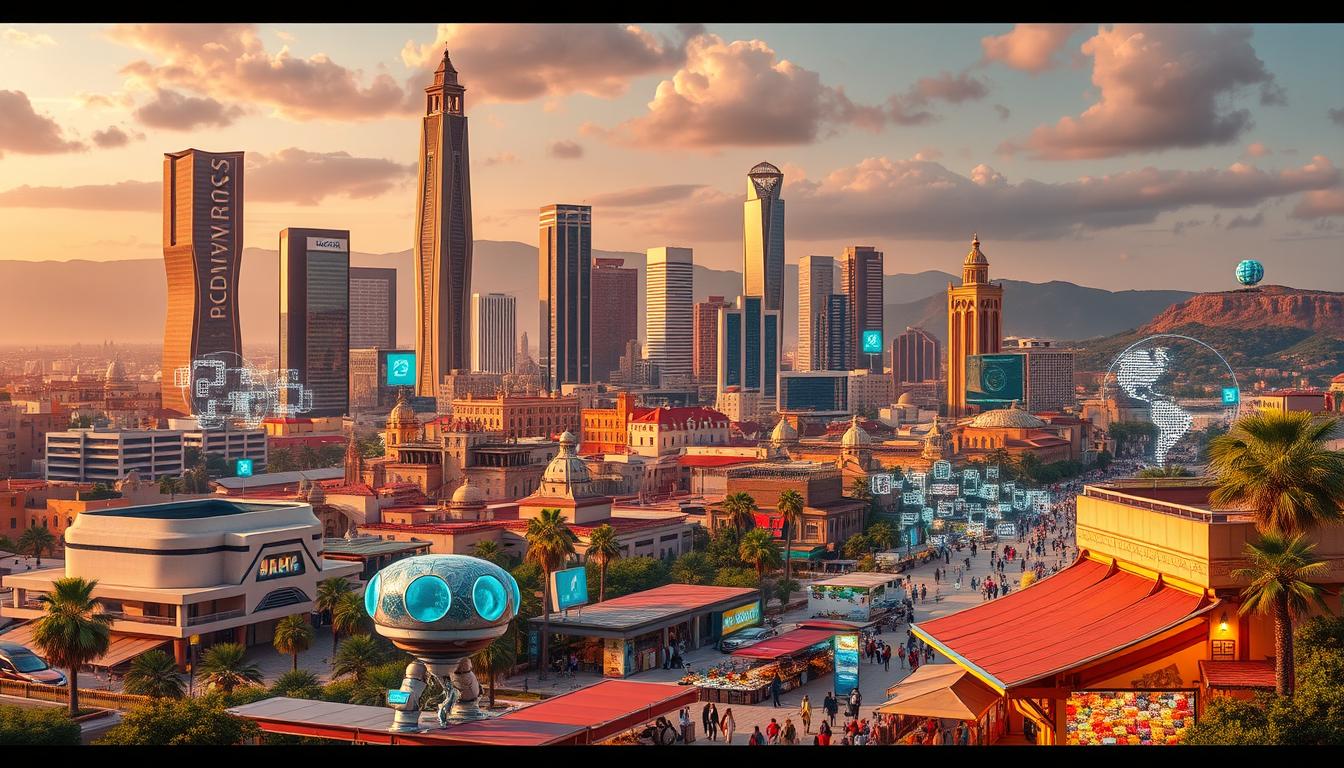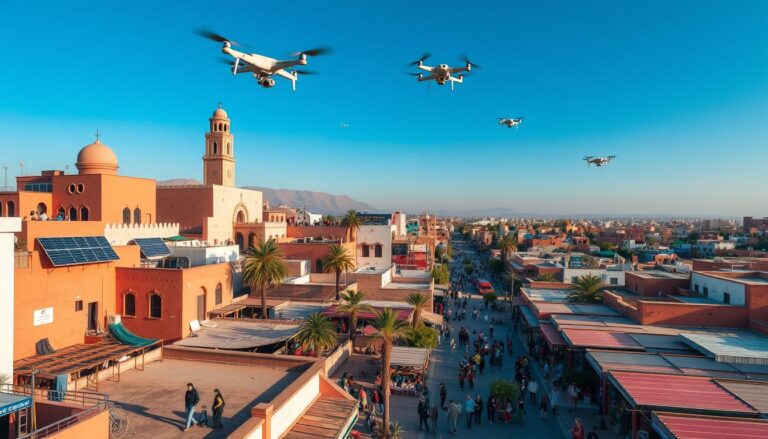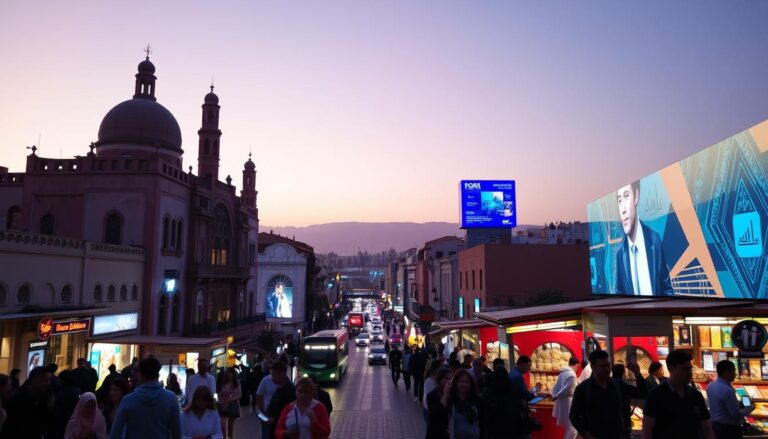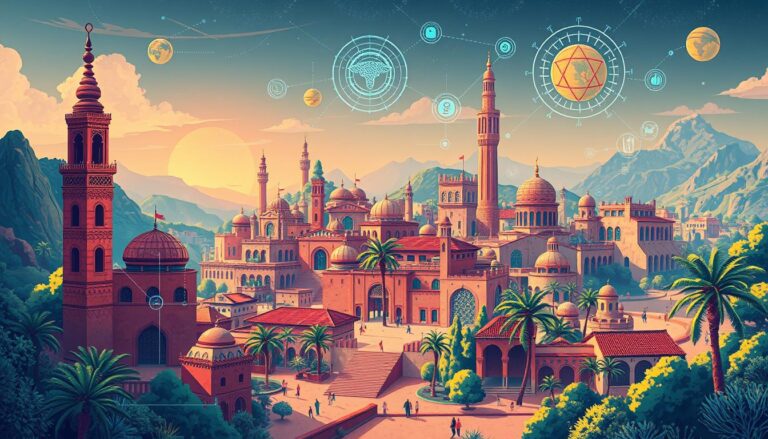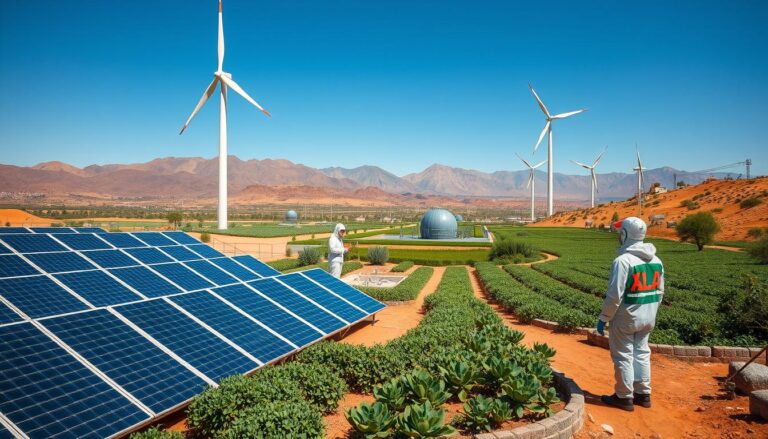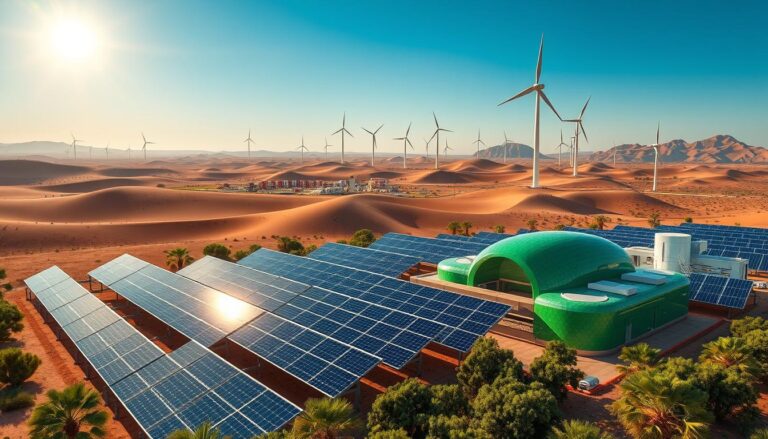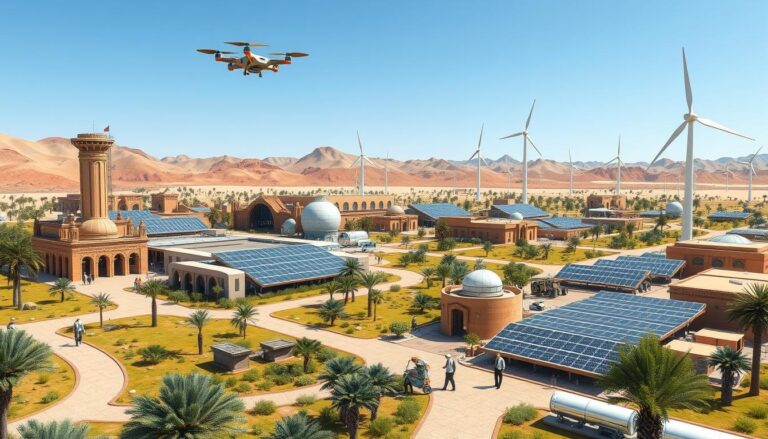Can Morocco become a digital powerhouse with AI technology? This question is central to Morocco’s Digital Morocco 2030 strategy. With a budget of $1.1 billion, Morocco aims to change public services with AI and blockchain. It hopes to boost the economy and create jobs.
What does AI Integration in Morocco’s Economy mean? The plan aims to improve public services and boost the economy. Morocco expects to create 240,000 digital jobs by 2030.
The AI and blockchain plans will make public services better and more open. Morocco is inviting tech companies and investors to join its digital journey. Read on to see how Morocco’s digital plans could change its economy and make it a digital leader.
Overview of AI and Blockchain in Morocco’s Digital Transformation
The Moroccan government has made artificial intelligence Morocco and blockchain technology key parts of its digital plan. These efforts are changing many areas, like public services and the economy.
The Role of AI in Public Service Digitization
AI is changing public service digitization in Morocco. A big example is the Unified Administrative Services Portal. It uses blockchain technology to make services in healthcare and education better. This makes things more transparent and efficient.
By using AI and blockchain, Morocco is leading the way in digitizing public services.
The Impact on Economic Growth and Job Creation
Morocco’s digital push goes beyond tech and into the economy. It aims to create a quarter-million jobs, thanks to AI. This will boost the digital sector’s GDP contribution.
The country’s growth rate has been 5.1% over the last decade. The service sector has grown 38% of GDP. These efforts are expected to keep Morocco’s economy growing strong.
The Digital Morocco 2030 Strategy
The Digital Morocco 2030 strategy is a bold plan to make Morocco a top player in the digital world. It uses new technologies and smart investments to aim for huge economic growth and digital change by 2030.
Key Objectives and Goals
The heart of The Digital Morocco 2030 strategy is using the latest tech. It has set clear goals:
- Grow digital exports to 40 billion dirhams by 2030, up from 17.9 billion in 2023.
- Create 3,000 startups by 2030, aiming for 1,000 by 2026.
- Get 70% 5G coverage and connect 5.6 million homes to fiber by 2030.
- Train 100,000 young people each year in digital fields, up from 14,000 in 2022.
- Boost digital education by tripling digital graduates by 2027.
- Make 600 public services digital to move Morocco up in the UN’s e-Government Index.
Budget Allocation and Investment
The Moroccan government is ready to invest heavily in this plan. It plans to spend 11 billion dirhams ($1.14 billion) from 2024 to 2026. This is to grow the digital economy and create 240,000 jobs in digital fields by 2030.
This big investment will improve Morocco’s tech infrastructure. It will boost 5G and create a sovereign cloud for secure data. The country also wants to bring better internet to 1,800 rural areas and partner with big IT companies.
This strong financial support shows the Moroccan government’s commitment to a strong digital economy. It’s focused on AI and new technologies. Morocco hopes to become a leader in offshoring, digital innovation, and sustainable growth.
AI-Driven Startups in Morocco
Morocco is becoming a key player in technology thanks to its rich innovation and government support for AI. The government’s efforts have made it easier for AI startups in Morocco to grow. This growth is thanks to smart policies that support innovation.
Supportive Legal Framework and Government Initiatives
The Moroccan government has set the stage for a digital future. They launched the Digital Morocco 2030 strategy with a $1.1 billion budget. This plan aims to create 240,000 jobs in the digital sector by 2030.
It also wants to improve the country’s digital ranking and boost digital exports. The strategy includes expanding 5G coverage and supporting 3,000 startups.
These efforts show how much the government supports AI. The Moroccan Agency for Digital Development plays a big role. It works to improve public administration through digital platforms.
By backing startups in AI and blockchain, Morocco aims to be a leader in these fields.
Success Stories and Key Players
Many Moroccan AI innovations have made a name for themselves globally. Companies like ATLAN Space and DataPathology are leading the way. They use AI for environmental and medical purposes.
These startups have made a big impact in Morocco and worldwide. They have also formed partnerships with big tech companies. This has helped Morocco become known as a hub for AI and blockchain.
AI Integration in Morocco’s Economy
Morocco is changing its economy with AI. It’s using AI and blockchain to improve government and business. This is making the country more prosperous and digital.
The Customs and Indirect Taxes Administration is using AI for better customs checks. AI helps spot fraud and makes border control more efficient. This is a big step for Morocco’s trade.
The General Directorate of Taxes is also using AI. It’s making tax services better and fighting tax evasion. This shows how AI is helping Morocco’s economy.
The Ministry of Economy and Finance is making things easier for everyone. It’s working on a “zero paper” plan to go digital. This shows Morocco’s commitment to modernizing.
Morocco is also improving its trade with other countries. It’s making customs clearance faster. The goal is to make Morocco’s economy one of Africa’s best by 2030.
Projects like DigiTPME and E-GOV are helping small businesses and government. They’re working with digital companies and local talent. This is helping Morocco become more digital.
Morocco is building a strong digital future. It’s investing in technology and innovation. This will help Morocco keep growing digitally.
Enhancing Public Services through AI and Blockchain
Morocco is moving forward with the help of artificial intelligence and blockchain. These tools promise to make public services more open and efficient. The goal is to make the government work better and meet international standards.
Unified Administrative Services Portal
At the heart of Morocco’s digital push is the Unified Administrative Services Portal. It uses blockchain to keep services safe and trustworthy. This portal aims to speed up government work and offer better services in areas like health and education.
Morocco wants to be among the top 50 in the United Nations Online Services Index by 2030. This portal is a big step towards that goal.
Improving Transparency and Efficiency
AI helps make sense of huge amounts of data, making government work better. Morocco is using AI to improve services and be more open. The country plans to use Big Data and the Internet of Things to achieve this.
Morocco also wants to create 240,000 jobs in the digital sector and increase digital exports to $4.15 billion by 2030. Projects like DigiTPME are key in making small businesses digital. The Moroccan Agency for Digital Development (ADD) is leading this effort with over $1.1 billion in funding.
Attracting Global Tech Companies
Morocco wants to be a top spot for tech investment. It aims to attract global tech partnerships. The country has a clear plan to become a hub for tech collaboration and innovation.
Incentives and Opportunities for Tech Firms
Morocco offers great incentives for tech companies. By 2030, it hopes to see digital exports soar to 40 billion dirhams. This is more than double the 2023 amount of 17.9 billion dirhams.
Revenue from digital outsourcing is also expected to grow. It will rise from 25 billion DH in 2026 to 40 billion DH by 2030. The government wants to create a place where innovation thrives, attracting both local and global tech companies.
- Tax exemptions and reductions.
- Streamlined administrative procedures.
- Dedicated tech parks such as the upcoming Eureka Park project in Tetouan.
The “High-Speed Plan 2” aims to improve internet access. By 2026, 1,800 rural areas will have internet. By 2030, 5.6 million households will have fiber-optic connections, and 70% of the population will have 5G.
Collaboration with International Partners
Morocco is teaming up with international partners to boost tech investment. It’s working with the Hashgraph Association to adopt new technologies. Moroccan startups like Tookeez are also making waves, getting $1.5 million for blockchain projects.
The Digital 2030 strategy aims to create 130,000 jobs in outsourcing. It also plans to improve vocational training. Morocco is also working on the Eureka Park project, a 386MW data center and AI hub.
This project will use power from the Noor Solar Power Complex. It’s set to be finished by the second quarter of 2026. This shows Morocco’s commitment to sustainable energy and tech growth.
With these partnerships and plans, Morocco is set for a bright tech future.
Impact on the United Nations Online Services Index Ranking
Morocco has made big strides in the digital world. The launch of the e-Maroc 2010 Strategy in 2005 was a key moment. It led to 377 websites and 547 public services online.
By September 2012, more people could access administrative procedures online. This was an 18% increase.
The Maroc Digital 2020-2025 strategy aims to make Morocco a digital leader in the Middle East and Africa. It focuses on digital management, innovation, and fighting social exclusion. Morocco wants to be known for its efficiency and accessibility.
The government also had a plan for open government from 2018 to 2020. It aimed to make public data and budget more transparent. Morocco saw a big jump in its e-government ranking, from 82nd in 2014 to 110th in 2018.
During the COVID-19 crisis, Morocco sped up its digital transformation. It reduced paper work and encouraged telework. These steps are expected to help Morocco rank higher in the United Nations Online Services Index.
The goal is to digitize all administrative transactions by 2030. Morocco wants to connect all structures to a single interface and use e-signatures. With these efforts, Morocco is set to rise in the international digital performance ranking.
Future of AI Technology in Morocco
Morocco is on the verge of a digital revolution. Its AI strategy aims to lead in tech in the region. A major AI forum in Rabat, from June 3 to 5, 2024, will showcase Morocco’s AI future.
Long-Term Vision and Expected Outcomes
Morocco’s AI vision is for long-term gains. The Digital Morocco 2030 plan has a $1.1 billion budget. It aims to create 240,000 digital jobs and boost GDP by $10.36 billion.
The plan also targets 40 billion dirhams in digital exports. It aims to cover 70% of the country with 5G and start 3,000 new businesses. Morocco wants to rank higher in the UN’s Online Services Index and open Africa’s first AI Center in Rabat.
Challenges and Solutions
Despite the promise of AI in Morocco, challenges exist. These include finding resources, developing skills, and improving infrastructure. The government is working on these issues through planning and international partnerships.
Supporting AI startups and creating a legal framework for them are key strategies. Morocco is also teaming up with countries like France, the USA, and China to overcome these challenges.
With 80% of Moroccans familiar with ChatGPT, the country is embracing AI. This shows Morocco’s eagerness for an AI-driven future.
Conclusion
AI is changing Morocco’s economy in big ways, leading to a more digital future. It’s making a big impact in banking, healthcare, tourism, manufacturing, and logistics. Moroccan companies are using AI to make better decisions and grow sustainably.
In healthcare, AI use has grown by 15% every year since 2018. It’s helping doctors make more accurate diagnoses and plan better. This puts Morocco ahead of countries like India and Tunisia in AI healthcare.
Morocco needs to keep improving in AI leadership and data privacy. Policymakers should focus on getting AI technologies and training leaders. This will help Morocco stay competitive in the digital world.
Morocco is also working on its infrastructure and economy to attract tech investments. It’s offering tax breaks and jobs to support growth. This shows a bright future for Morocco’s economy and its people.
Source Links
- Harnessing Generative AI for Enhanced Learning in Moroccan Education: A Case Study Investigation
- Artificial Intelligence (AI) – United States Department of State
- Morocco’s Economy & main industries
- Morocco Unveils 2030 Digital Strategy
- Morocco’s Digital Strategy 2030 To Be Launched Soon, Head of Gov’t
- Morocco turns to AI, blockchain to achieve ‘digital hub’ goal by 2030
- Morocco to Leverage AI and Blockchain in Ambitious Plan to Become Digital Hub by 2030
- Minister: Morocco to Enhance Public Services With AI Integration
- Digital Transformation Center Morocco | BMZ Digital.Global
- Distributed Ledger Technology to Play a Central Role in Morocco’s 2030 Digital Strategy
- Morocco unveils ambitious "Digital 2030" strategy for a technological future – 7news Morocco
- Distributed ledger technology to play a central role in Morocco’s 2030 digital strategy
- Huge 386MW Data Center in Morocco Planned by U.S. AI Firm – HostingJournalist.com
- Morocco: The Impact of the Digitization of Public Services
- A High-Level Forum to Envision the Future of AI in Morocco and Africa
- Morocco Leads Africa in ChatGPT Adoption, Showcasing Rapid Embrace of AI Technology –
- Applications of Artificial Intelligence in Morocco’s Healthcare Sector A Springboard to Medical Excellence
- Morocco: The Next Industrial and Technological Hub 🇲🇦🇪🇺🇺🇸🇬🇧

The Editorial Team is a passionate group of Morocco enthusiasts dedicated to sharing the beauty, culture, and wonders of this captivating country. With diverse backgrounds and a deep love for travel, we strive to bring you engaging and informative content that inspires your Moroccan adventures. From uncovering hidden gems and sharing local insights to exploring mouthwatering cuisine and showcasing the vibrant lifestyle, our team is committed to providing you with valuable resources and exciting stories that enhance your exploration of Morocco. Join us on this journey as we celebrate the rich heritage and unforgettable experiences that make Morocco truly special.

